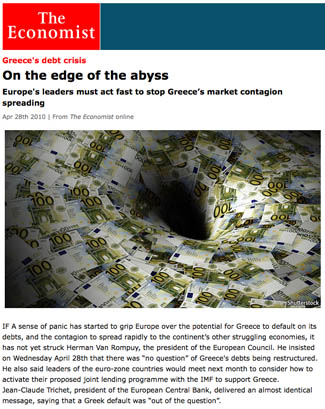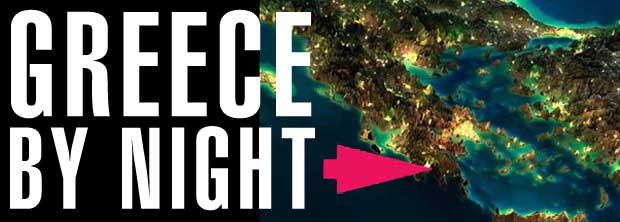
Live cam shot of Athens from the south, From http://www.pireas.gr/
Archive Page - April 2010
April 29, 2010
Germany under pressure to save the day; Merkel facing hard decisions - Economist
 The Economist is all over the Greek / Europe debacle with an article not much on subtlety "On the edge of the abyss - Europe's leaders must act fast to stop Greece’s market contagion spreading:"
The Economist is all over the Greek / Europe debacle with an article not much on subtlety "On the edge of the abyss - Europe's leaders must act fast to stop Greece’s market contagion spreading:"
"On Wednesday Greece said that it would ban the short-selling of shares for two months to prevent speculators doing further damage to the country’s banks. The previous day, shares in Greek banks had plunged by nearly 10% and the Athens stockmarket as a whole fell by 6% on fears that the country would soon suffer another downgrade of its debts. Those fears proved entirely justified. After the markets closed Standard & Poor’s heaped indignity on Greece by cutting the rating of its sovereign bonds to “junk” status. It also cut Greece's banks to “junk” because of their hefty exposure to government debt.
Germany, as the largest euro member, is vital to any effort to save Greece, but it is wavering. German public opinion is firmly set against dipping into the public purse to help the profligate Greeks. Angela Merkel, Germany’s chancellor, is in a tight spot. If she agrees to extend aid quickly to Greece a voters’ backlash back home may send her party crashing to defeat in regional elections set for May 9th. But if she sits back and watches Greece slide towards default, the contagion is sure to spread rapidly to other, bigger EU countries with debt problems—Mrs Merkel could then end up being blamed for triggering a far worse conflagration across Europe, including a fresh banking crisis."
It's not just money that's getting trashed: the political order in Europe is taking a beating and may yield to a new and unforseen results. Elections are on the calendar and the resentments over bailing out greece will start showing up in the ballot boxes of Europe:
"ANGELA MERKEL’S political credibility has not yet been downgraded to junk status, but the past few days have done it no good at all. A few weeks ago the German chancellor was basking in plaudits for taking a hard line against a European bail-out of Greece. That was before George Papandreou, the Greek prime minister, bowed to the inevitable on April 23rd and asked for the €30 billion ($40 billion) loan pledged by Greece’s euro-zone partners, of which Germany’s share is about €8 billion. A further slice, of perhaps €15 billion, may come from the IMF.
Now Mrs Merkel is under fire both from those who had praised her and from those who now blame her for dragging out the rescue, further destabilising financial markets and raising the ultimate cost of the bail-out. Reported politicians’ estimates of the whole bill have soared to €120 billion and far beyond, with a correspondingly greater contribution from Germany.
Many Germans feel they are being forced to choose between two basic principles of their post-war economic order: economic stability and integration within Europe. They gave up the D-mark in 1999 on the understanding that the euro would be equally stable and that German taxpayers would not have to pay for other members’ mistakes. The impending bail-out of Greece—and perhaps later of Portugal and even Spain—would mean the end of that bargain. A Greek bail-out would no doubt face a challenge in Germany’s constitutional court. But to withhold aid would endanger the currency and rattle the banks, some of them German, with billions of euros’ worth of Greek debt on their books. "
Things are going to get hot for the Americans too:
"Opinion polls suggest more than 60% of Greeks oppose the government’s decision to call in the fund. The IMF’s reputation for imposing harsh reforms, along with the partial surrender of sovereignty to an American-based institution, seems bound to make Greeks cross. Criticism of Germany, by comparison, is muted."

Live cam shot of Athens from the north, From nifada.com
April 23, 2010
Help! Greece turns to IMF fund for immediate relief
It's started: a bailout of the teetering Greek government finances is now at the feet of the IMF. Bloomberg has the story:
"The request came one day after the yield on the country’s benchmark two-year note topped 11 percent, approaching that of Pakistan, and Moody’s Investors Service lowered Greece’s creditworthiness by one notch to A3, saying it was considering further cuts.
...Greece called for activation of a financial lifeline of as much as 45 billion euros ($60 billion) this year in an unprecedented test of the euro’s stability and European political cohesion.
The appeal for help from the European Union and International Monetary Fund follows a surge in borrowing costs to what Greek Prime Minister George Papandreou called unsustainable levels that undermine efforts to cut a budget deficit of more than four times the EU limit. Greek bonds and stocks rallied after the announcement.
“There was no response from the markets, either because they didn’t believe in the political will of the EU or because they decided to go on with speculation,” Papandreou said today. “The situation threatens to demolish not only the sacrifices of the people but also the regular course of the economy. All the efforts by the Greek people are in danger of being in vain.
...Papandreou had called the EU-IMF aid facility a “loaded gun” that would lower borrowing costs in the market and make an actual request for support unnecessary. Investors weren’t intimidated and the rout in Greek bonds intensified after the aid package was adopted on April 11.
Greek 10-year bond yields have soared more than 125 basis points since then and topped 10 percent yesterday, the highest since 1998. The yield premium that investors demand to hold Greek 10- year bonds instead of benchmark German debt widened to more than 500 basis points, the most since before the euro’s 1999 debut.”
Economist: Bailout might be short term relief at best
While there might be a sigh of relief in Athens (and in the various EU capitols) that the IMF will hand off euro 45 billion in low interest money to help Greece paddle through the current economic mess, the Economist is saying that more like euro 75 billion is needed for a five year turnaround in Greek finances, and a stablization of an incredible 142% of GDP is possible:
"George Papandreou, faced the television cameras on Friday 23rd April to anounce that his government would draw on emergency aid to tide it over for the rest of the year. Mr Papandreou decribed the rather embarassing request to to other euro zone members and the IMF as “an extreme necessity.” This followed a week in which yields on Greek bonds reached an alarming 8.9%. That in part reflected an announcement by Eurostat, the European statistics agency, that Greece’s budget deficit reached 13.6% of GDP in 2009, even worse than it had previously thought. The agency added that the number might be revised up again, owing to the poor quality of the available data. Moody’s, a credit-rating agency, responded by giving the latest of many downgrades by agencies to Greece’s sovereign bonds.
The interest rate for emergency aid from other members of the euro zone will be 3.5 percentage points above the benchmark “risk-free” rates for euro loans. That works out at around 5% for a fixed-rate loan, which is less than markets were asking of Greece before the deal was struck but still steep. Portugal and Ireland, the next-riskiest borrowers in the euro area, pay less than half as much for three-year money. Germany pays a mere 1.3%.
The IMF is expected to make €15 billion available, at interest rates that are likely to be a little kinder to the Greeks. The resulting package of €45 billion should be enough to finance Greece’s budget deficit for the rest of this year as well as repay its maturing debts.
...It will be hard for Greece to make such savage cuts in its budget and emerge from recession at the same time. Furthermore, prices and wages will have to fall if Greece is to regain the cost competitiveness needed for sustained economic growth. That will drag down nominal GDP in the short term, and make budget cuts more difficult to carry out.
Our analysis may even be too optimistic. If economic growth does not return, deficit reduction proves too painful or interest rates are much higher than we assume, the debt ratio is likely to spiral upwards until default becomes all but inevitable."
For even more crummy news, see this related Forbes.com article on the general level of world debt and the threat of disaster based on deficit living:
"Most investors seem to believe, as the late Citibank chairman Walter Wriston put it, that "countries don't go bust." The opposite is true. "There was a massive default wave in 1980s and 1990s," says Reinhart. Investors may not have paid much attention since the defaults were mostly in emerging market countries like Guatemala and Romania. But the deadbeats included current investor favorites like Brazil, which defaulted in 1983, went through a bout of hyperinflation in 1990 and effectively defaulted again, for the same reason, in 2000. Reinhart and Rogoff show that, on average, nations add 86% to their debt loads within three years of a credit crisis."
April 22, 2010
Greece hammered again by EU stats; GDP deficit goes to 13.6%
More trouble for the government of Papandreou as the release of EUROSTAT info shows the debt deficit against GDP to have climbed from 12.7 to 13.6 (EUobserver online):
" The deplorable state of EU government finances was laid bare on Thursday (22 April), following the release of 2009 budget deficit figures by the EU's statistics agency, Eurostat.
Greece's deficit was shown to have reached 13.6 percent of GDP for the year, considerably higher that the previous 12.7 percent forecast, sending the country's borrowing costs skyward and prompting a new credit rating downgrade from the Moody's credit rating agency.
EU officials said the Greek deficit cutting target of four percent for this year still remained in place, but indicated that extra measures would be needed if the debt-ridden country was to successfully bring its deficit below three percent by 2012, as promised to Brussels.
Despite the ongoing efforts in Greece to raise money through issuing bonds, etc.,using the money to pay off immediate existing debt obligations, Greek newspapers are starting to throw in the towel (From Kathimerini online (English page):
"Since last autumn, the government has found itself constantly one step behind the reality of international markets and circumstances. Today, Greece presents a picture of a bankrupt country. There is only one solution: immediate recourse to the joint EU-IMF support mechanism. The longer the government hesitates, the greater the risk of some “accident” that will jeopardize key supports of the Greek economy. "
The Financial Times alphaville blog carries a round up of opinion on what it all means. Some of the remarks seem obvious (this from Greg Gibbs at Royal Bank of Scotland):
"The sell off in Greek debt accelerated overnight; 2yr yields jumped 244bp to 10.22%, 10 year yields jumped 75bp to 8.84%. This is the highest yield levels since 1998. The collapse in confidence in Greece is almost complete. It is pretty remarkable that short term yields are so weak in light of the EU/IMF bailout package that has been promised. Is the market betting that the Greek authorities will not be willing or able to meet the austerity measures that are likely to be imposed and does it think then the package will not hold up? Does it think that Greece will just think what is the point and opt to leave the Euro?"
The odds that Papandreou will be able to lead PASOK to make austerity decisions that go against the net of Union and public sector political obligations seems more and more remote, besides the fact time is running out, or has run out already. Maybe the thinking in Greek politics is letting the whole thing crash and burn is better than destroying PASOK's appeal with its core constituencies, who they will need later when/if this situation finally goes away.
The juggling to keep the current situation from blowing up (although the term of the Greek economy "blowing up" seems to have been used over and over in much of the commentary I have seen) is noted by the fixed income team at Evolution Securities (quoted in the Financial Times article):
"The market is increasingly looking at the possibilities of a Greek debt restructuring as the 5 year CDS closed at a new high of 627bps a 159bps widening on the day and the 2 year yield ended the day at 10.18% or 932bps over bunds. Is a restructuring likely? The amounts available to Greece under the EU/IMF rescue package as it stands is between €40bn-€45bn depending on the size of IMF funding, although the EU has left open the possibility of further financial assistance in 2011 and 2012. Greece has said it needs to borrow €43bn in 2010, we would add €2bn to that figure based on yesterday’s revised deficit numbers, so far this year Greece has raised €18bn from bond issuance, leaving it short of €27bn that needs to be financed over the rest of the year. The funding requirement over the next two years will be at least as high as this year’s as higher redemption payments offset the planned reduction in the deficit."
As has been pointed out, the rush by the strapped nations of Europe (especially Portugal, Ireland and Spain) to default and to get at the financial aid might happen overnight: better to get in fast before all of the money is gone. The dominos could fall very quickly indeed.
April 8, 2010
Some worry Greece is the canary in the coal mine
The options for Greece to juggle national government spending, domestic entitlement spending and to also maintain debt payments is getting harder (yahoo/AFP):
"The Greek state needs a white knight with moneybags, and our fate is pointing towards the IMF," the source added.
"No other organisation can unlock the sums needed at this stage. A bailout of 2.0 to 5.0 billion euros would be akin to giving aspirin to a dying man."
He added that the problem was likely to get worse in two years' time due to Greece's money costs far outstripping that of other eurozone states.
"The Greek economy would need to run doubly fast to keep up and there is no guarantee that it can do that," he said.
Greece has so far managed to secure the loans it needs but at high cost and dwindling demand in Europe, leading it to consider American buyers for its next bond issue.
It needs to borrow some 11.5 billion euros by May to cover its payment obligations."
The market for Greek debt is taking a beating and making the prospect of default loom closer [Associated Press]:
"World markets slid Thursday amid mounting worries about a potential Greek debt default as the country's borrowing costs continue to go through the roof.
Particularly worrying is that the spread between the Greek and German 2-year bonds swelled by a staggering 1.2 percentage points Thursday as investors demanded more interest just to hold Greek debt. Greek shares took another battering - the benchmark ASE composite index was down around 5 percent.
Greece has returned to the forefront of investors' concerns this week with a vengeance, barely two weeks after the EU finally agreed to a backstop bailout mechanism for the debt-laden country, that would also involve the International Monetary Fund.
"With or without support from the EU the bottom line remains that after years of fiscal mismanagement the market has little confidence that Greece can swallow the necessity austerity measures and slash its budget deficit," said Jane Foley, research director at Forex.com."
Bloomberg has more on the climb of interest Greece will have to pay to continue to receive funds from investors for the current cycle of borrowing money to make existing debt payments:
"Greek two-year notes slid for a seventh day and the 10-year yield premium to German bunds jumped to the most since the euro’s debut after Finance Minister George Papaconstantinou said there will be no need for additional measures to shore up the nation’s finances.
The decline drove the yield on the two-year note up 124 basis points, bringing the increase since the streak began to 361 basis points. The 10-year yield climbed 30 basis points, or 442 basis points more than bunds, the benchmark for borrowing in Europe, based on Bloomberg generic prices. Greek stocks fell and credit-default swaps on the nation’s debt rose to a record.
Investors are growing increasingly concerned that a European Union and International Monetary Fund rescue plan put together last month for Greece, the region’s most indebted nation, will unravel."
The problem for Greece is that they have to sell bonds in order to keep from slipping into a variety of even worse scenarios, possibly the most drastic one being the dissolution of their EU membership, which would threaten a variety of other small countries to follow suit (Portugal, Ireland, among others, are dealing with problems similar to the one in Greece).
Germany and France do not want to see a crack of this size to splinter the European Union, possibly bringing about a crash of the whole system as smaller nations run willy-nilly toward finding temporary solutions for their money woes. The internal pressures in these countrys could bring about drastic changes in leadership that may not be as compliant with EU directives.
Hugely unpopular in the healthier EU nations is the notion of simply bailing out Greece from its accelerating cash and debt crisis, so attempting to do so could be the death knell for the careers of the existing crop of politicians ruling Europe. Equally problematic is implementing any austerity measures in Athens that would step on the toes of the powerful union and government civil worker groups and other well-connected publicly funded organizations that are already using public protests and strikes to pressure the Andreas Papandreou government to not take a budget scalpel to their particular piece of the money pie. If the whole Rube Goldbergian machine of debt management finally falls apart, that money pie will be revealed as a mirage, and each group will be forced to reveal if it would prefer to enter a severe economic depression for all or to accept the kind of deep cuts necessary to at least dampen the increasing debt pressure.
From the UK Telegraph:
"Greece has so far managed to secure the loans it needs but at high cost and dwindling demand in Europe, leading it to consider American buyers for its next bond issue. It needs to borrow €11.5bn by May to cover its payment obligations. The country is mired in a deepening recession and is trying to reduce a mountain of debt of nearly €300bn. "
For 2009, the CIA worldbook data sheet says that Greek GDP was $339.2 billion.
April 2, 2010
EU: Who Gets Money
Allocation of funds in EU not targeting Greece [euobserver online]:
"Troubled economies such as Greece and Romania have so far managed to secure the least amount of EU money earmarked for infrastructure, energy and employment programmes in 2007-2013, a report by the European Commission shows."
This reminds me of how Federal funds in the United States are allocated: political connections and strange deals in Congress determine whether this or that region gets money. This results in sometimes odd projects like bridges for places where there are hardly any inhabitants; likewise, you find still existing unpaved, graveled roads within the poorer areas of a city like Washington DC. The determination of allocation for infrastructure is warped by that perennial governing principal of connections, graft and spoils rewards.
This is an archive page, see the current home page here
ARCHIVE PAGE - MAY 19 TO MAY 31 2010
ARCHIVE PAGE - MAY 1 TO MAY 18 2010
ARCHIVE PAGE - DEC 2009 - MARCH 2010



Greece's Golden Visa program
